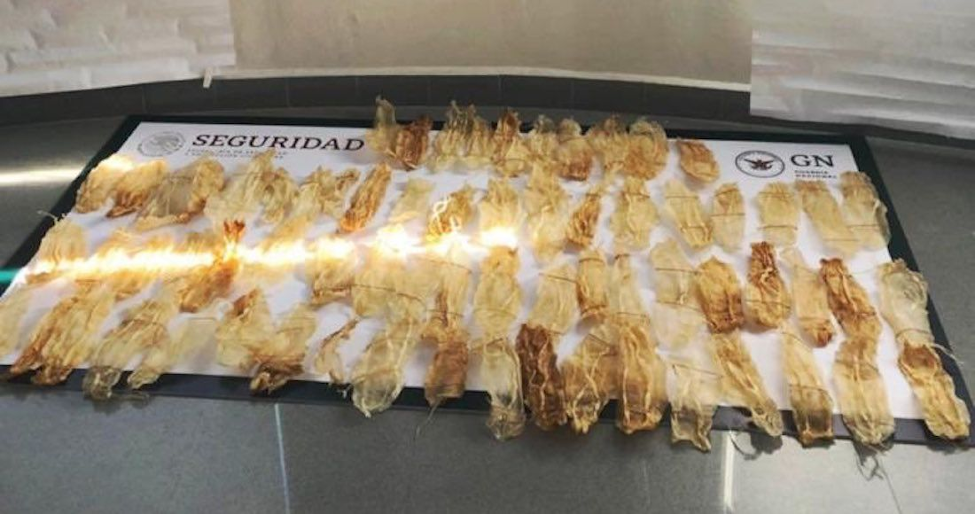08/31/21 (written by rramos) – Officials from the federal Attorney General’s Office (Fiscalía General de la República, FGR) seized four properties in San Felipe, Baja California on August 12 after a joint investigation by multiple agencies determined the buildings were being used by a criminal network dedicated to the illegal trafficking of totoaba fish. Along with a cache of totoaba organs and fishnets, FGR officials also discovered firearms, tactical vests, and radio equipment while inspecting the seized properties. Investigators told La Jornada that they believe the totoaba fish found in the confiscated buildings were meant to be exported illegally from Baja California to China as part of a transnational criminal venture.
The High Price of Totoaba Fish
The totoaba is a species of saltwater fish native to the Gulf of California that is protected under international and Mexican law. It has become increasingly endangered due to poaching. In particular, the totoaba’s swim bladder is highly sought after in parts of East Asia for use in traditional medicines and as a culinary delicacy. The strong demand for totoaba has resulted in remarkably high prices for illegally harvested totoaba bladders and meat. Dr. Lorenzo Rojas-Bracho, director of the environmental advocacy group Proyecto Vaquita CPR, told Milenio in a 2019 interview that one kilogram of totoaba could be sold for as much as $100,000 U.S. dollars on the black market in China. Similarly, an investigative article published by Excelsior in July 2021 found that one kilogram of totoaba bladder could command a price of up to one million Mexican pesos in Hong Kong.
The potential for large profits is compelling a growing number of organized crime groups in Mexico to add totoaba poaching to their portfolio of illicit activities. In June 2021, investigators in Baja California reported that criminal cells linked to Los Chapitos—the sons of jailed Sinaloa Cartel kingpin Joaquín “El Chapo” Guzmán—were seeking to deepen their presence in towns near the Gulf of California like San Felipe in order to forge operational ties with suspected totoaba traffickers. According to a report by non-governmental organization Earth League International, criminal groups in northwestern Mexico may be increasingly attracted to totoaba trafficking because it can generate profits comparable to those gained from drug trafficking, but with a perceived lower risk of being detected by authorities.

Growth in Environmental Crimes
The illegal poaching of totoaba fish is just one example of a range of environmentally-related crimes that are gaining popularity among criminal groups in Mexico. Both the Center for Biological Diversity in Mexico (Centro para la Diversidad Biológica en México) and the Mexican Environmental Impact Academy (Academia Mexicana de Impacto Ambiental) warned in May 2021 that the illicit trade of rare and exotic animals, such as tigers, chinchillas, freshwater turtles, and other species, has increased considerably in recent years. In Mexico City alone, data from the Federal Prosecutor for Environmental Protection (Procuraduría Federal de Protección al Ambiente, PROFEPA) showed that the number of exotic animals rescued in anti-wildlife trafficking operations skyrocketed from roughly 5,000 in 2019 to over 33,000 in 2020. A joint statement by the federal Secretary of Environmental and Natural Resources (Secretaría de Medio Ambiente y Recursos Naturales, SEMARNAT) and the Financial Intelligence Unit (Unidad de Inteligencia Financiera, UIF) affirmed that many wildlife trafficking cases can be linked to organized crime networks.
Another environmental crime that continues to raise alarm is illegal logging. Statistics compiled by PROFEPA suggest that illegal logging carried out by criminal groups is increasing. In 2020 alone, Mexico suffered the loss of around 127,770 hectares of forest due to illegal logging, an amount greater than the total deforestation recorded between 2010 and 2015. Heightened interest in the illegal timber trade has not only generated increased fighting between criminal groups in places like Chihuahua, but it has also had a devastating impact on the natural environment in areas in which it occurs. According to Rodrigo de la Garza, a geology professor at the Autonomous University of Chihuahua (Universidad Autónoma de Chihuahua), the accelerated growth of illegal logging has begun to result in desertification in previously forested areas of the Sierra Tarahumara mountain range in western Chihuahua.
Diversification of Illicit Economies
The steady expansion of criminal organizations into illicit activities related to the environment and wildlife is consistent with the broader diversification of criminal enterprises that has been observed in recent years. Although organized crime groups in Mexico have been traditionally associated with drug trafficking, criminal actors have increasingly broadened the scope of illicit activities through which they earn profits. The factors driving diversification are diverse, but one widely cited reason is that as larger criminal organizations in Mexico fragment and splitter into increasingly smaller groups, criminal networks become more localized and therefore turn to revenue sources that “require no supply chains and have very low barriers to entry.” Another possible cause is that stringent enforcement actions by authorities against drug trafficking have reduced profits and increased risks, thereby compelling criminal groups to explore new and emerging revenue sources.
As has been seen with the larger phenomenon of diversification, the increasing visibility of environmentally-related crimes in Mexico is another demonstration of organized crime groups’ ability to remain adaptable and resilient. In the absence of comprehensive efforts to build and sustain the rule of law in Mexico, criminal economies that negatively impact the environment, like totoaba poaching, may continue to emerge and grow in the country.
Sources:
Calderón, Laura Y., Heinle, Kimberly, Kuckertz, Rita E. et al. “Organized Crime and Violence
in Mexico 2020 Special Report.” Justice in Mexico. July 2020. 46-47.
Urbina, Ian. “Unmasking China’s invisible fleet.” CBC News. July 23, 2020.




